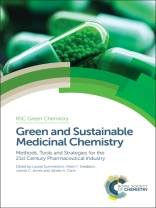Pharmaceutical manufacturing was one of the first industries to recognize the importance of green chemistry, with pioneering work including green chemistry metrics and alternative solvents and reagents. Today, other topical factors also have to be taken into consideration, such as rapidly depleting resources, high energy costs and new legislation. This book addresses current challenges in modern green chemical technologies and sustainability thinking. It encompasses a broad range of topics covered by the CHEM21 project – Europe’s largest public-private partnership project which aims to develop a toolbox of sustainable technologies for green chemical intermediate manufacture. Divided into two sections, the book first gives an overview of the key green chemistry tools, guidance and considerations aimed at developing greener processes, before moving on to look at cutting-edge synthetic methodologies. Featuring innovative research, this book is an invaluable reference for chemists across academia and industry wanting to further their knowledge and understanding of this important topic.
Inhoudsopgave
Green and Sustainable Chemistry: An Introduction;
Tools for Facilitating More Sustainable Medicinal Chemistry;
Renewable Solvent Selection in Medicinal Chemistry;
Beyond Mass Based Metrics: Evaluating the Greenness of Your Reaction;
The Importance of Elemental Sustainability and Critical Element Recovery for the Pharmaceutical Industry;
Presence, Fate and Risks of Pharmaceuticals in the Environment;
Benign By Design;
From Discovery to Manufacturing: Some Sustainability Challenges Presented by the Requirements of Medicine Development;
Medicinal Chemistry – How “Green” Is Our Synthetic Tool Box?;
Design of Experiments (Do E) For Greener Medicinal Chemistry;
Pd-Catalysed Cross-Couplings for the Pharmaceutical Sector and a Move to Cutting-Edge C-H Bond Functionalization: Is Palladium Simply Too Precious?;
The Growing Impact of Continuous Flow Methods on the Twelve Principles of Green Chemistry;
Green Catalytic Direct Amide Bond Formation;
Synthetic Biology for Organic Syntheses;
Biocatalysis for Medicinal Chemistry;
Base Metals in Catalysis: From Zero to Hero;
Green and Sustainable Halogenation Processes.
Over de auteur
James H Clark is Professor of Chemistry at the University of York, and is Founding Director of the Green Chemistry Centre of Excellence and the Bio-renewables Development Centre. He started the award-winning company Starbons Ltd and he is now involved in commercialisation of novel bio-based solvents and new green technologies. He was founding scientific editor of the world-leading journal Green Chemistry. His research has led to numerous awards including Honorary Doctorates from universities in Belgium, Germany and Sweden. He has Visiting Professorships in South Africa and China, and was recently appointed as Chair-Professor at Fudan University. He has published over 500 articles (h index over 72) and written or edited over 20 books and is Editor-in-chief of the RSC Green Chemistry book series. He has received numerous awards and distinctions including the 2018 Green Chemistry prize.












